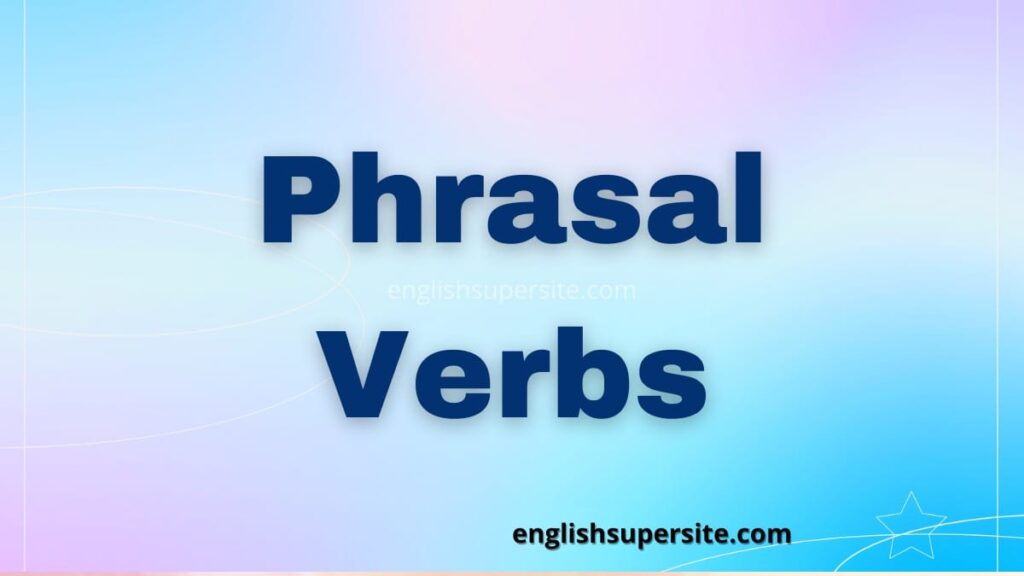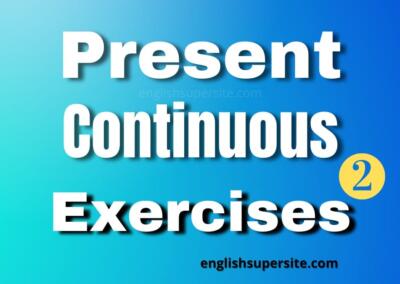
What are Phrasal Verbs?
Extremely popular in spoken English, phrasal verbs can be confusing sometimes due to their definitions that are not always easily guessed.
Phrasal Verbs are verbs followed by what is called a ‘particle‘. This ‘particle’ is either a preposition or an adverb, or possibly one of each. This particle can be a preposition or an adverb that creates a meaning different from the original verb. For example, “take off” means to remove, but it also means to depart or leave.
In other words, a phrasal verb combines a regular and ordinary verb with an adverb or a preposition to form a completely new verbal phrase. A phrasal verb’s meaning is often unrelated to the meanings of the components that form it; hence, consider a phrasal verb to be an altogether new and independent term.
All students of English need a basic understanding of the most common phrasal verbs and how to use them in everyday life. They are important and sometimes there is no other way to say them but to use a phrasal verb.
Separable and non-separable phrasal verbs
Phrasal verbs can be either separable or non-separable.
Separable phrasal verbs are those in which the particle can come before or after the verb’s object. In the sentence “I’m going to pick up my sister from the airport,” for example, the phrasal verb “pick up” is separable since the particle “up” can come before or after the object “my sister.”
Non-separable phrasal verbs, on the other hand, are those in which the particle must always follow immediately after the verb and cannot be detached from it by the object. The particle “into,” for example, cannot be separated from the verb “ran” by the object “room” in the sentence “She rushed into the room.” The phrasal word in this situation is “run into.”
It is vital to remember that the separability of a phrasal verb might vary depending on the context. Some phrasal verbs can be separated in some circumstances but not others. The phrasal verb “turn off,” for example, is normally non-separable, as in “I turned off the lights,” but it can be separable in specific instances, such as “I switched off the lights in the bedroom.”
Unfortunately, no rule will help you to look at a phrasal verb and always know whether it is separable or non-separable.
Separable
Separable phrasal verbs can be separated by their object.
Examples:
He put a jacket on.
I had pick them up from the airport last night.
Please give the keys back to me.
Non-separable
Non-separable phrasal verbs cannot be separated by their object
Examples:
The car ran into a tree.
You didn’t fall for that nonsense, right?
The party came off well.
How to conjugate a phrasal verb
To conjugate, when a phrasal verb is employed as the main verb in a phrase, the verb part is conjugated while the other words remain unchanged. Simply use the verb in the form you would use if it were alone.
The conjugation of a phrasal verb is determined by the verb’s tense and subject. In general, phrasal verb conjugation follows the same rules as any other verb in English. Here are some examples of phrasal verb conjugation in different tenses:
Examples:
Simple Past: He turned off the computer and went to bed.
Past continuous: They were turning off the lights when I walked in.
Simple Present: I turn off the TV every night before bed.
Present continuous: She is turning off the lights as we speak.
Simple Future: I will turn off the lights outside before I go to bed.
Future continuous: I will be putting on my sneakers by the time he arrives for our walk.
List of most common Phrasal Verbs
A – F
Ask out
Invite on a date.
He asked her out.
Back up
Support.
They all backed me up over my decision.
Break down
To stop working.
The car broke down last night.
Break up
End a relationship.
She broke up with him a couple of days ago.
Bring up
Mention.
Please don’t bring that topic up, I am tired of it.
Blow up
Explode.
To build a new mall, they had to blow up the old one.
Carry on
Continue.
After his death, she had to carry on with her life.
Catch up
To get to the same point as someone else.
He left earlier but she caught up with him.
Come across
Find something or someone unexpectedly.
I came across our old pictures last night while I was looking for my glasses.
Come up
Occur or present itself especially unexpectedly.
We must come up with a solution to this problem.
Cut off
To stop or interrupt.
The cut-off date to register is December 31.
Dig up
To uncover or find.
They dug up fossils of a huge animal in their backyard.
Drop off
To deliver or leave something somewhere.
Could you please drop me off at the airport on your way to work?
Fill in
To complete. Also, to provide more information.
Just fill this in with tap water.
Can you fill me in on what happened during my vacation?
G – H
Get away
To escape or leave.
Can you believe that they could get away with that robbery?
Get back
To return.
We just got back from our vacation to Florida to Relax!
Get on
Step onto a vehicle.
Hurry up, get on the bus quickly.
Get over
Overcome something or a problem.
You must get over this situation and pass the exam.
Get together
To meet.
Let’s get together and celebrate this weekend.
Go after
Try to achieve something
You must go after your dreams!
Get up
Stand up. Also, to get out of bed.
You should get up at least every 50 minutes to walk around.
I get up early on weekdays and sleep in on weekends.
Give away
Give something free as a gift or donation; reveal the truth or information
He gave away the money before he died.
Give in
Stop or cease arguing or fighting for something.
She was determined never to give in.
Give out
To distribute something
They have been giving out those flyers to people.
Give up
Admit defeat; stop or cease making an effort.
Work hard and never give up.
Go through
To examine or look at carefully.
The world is going through a period of economic instability.
Hand down
To give something used to someone else
I handed my old clothes down to Goodwill.
Hand out
To distribute or give out.
Please hand out these flyers (also fliers) to the public.
Hold on
To wait or stop.
Hold on, slow down, please!
Hurry up
Move fast, requiring haste or urgency.
Hurry up, get on the bus quickly.
K – P
Kick off
To start or begin.
To begin the project officially we need the kick-off meeting.
Let down
Fail to help or support.
You must fight this illness, don’t let me down!
Let in
Allow or permit to enter.
It is cold outside, please let them in.
Look after
Take care of it.
I have to look after my younger brother this weekend.
Look down on
Consider inferior
He is always looking down on his coworkers.
Look for
Try to find it.
I am looking for my keys, have you seen them?
Look out
Be careful or watch out.
Look out! The tree is going to fall!
Look up
To search for information.
I didn’t know the meaning of that word, I had to look it up in the dictionary!
Make up
To create or invent.
Don’t believe her history, she made that all up.
Pass away
To die.
She passed away last night.
Pass out
To faint.
It was so hot outside that the pregnant woman passed out.
Pick up
To collect something or someone. Also, answer a phone call.
Can you please pick her up from the airport tomorrow morning?
Please, pick up the phone, it is ringing for half an hour already!
Point out
Indicate something.
The teacher pointed out the errors in my essay.
Put down
Put something that you are holding down on the floor or table.
The police officer said: put down your weapons and hands up!
Put off
To postpone or delay.
Inflation was so high last year that we had to put off our vacation until this year.
Put out
Extinguish or terminate.
The firefighters put out the fire in about 5 minutes.
Put up with
To tolerate or deal with.
I can’t put up with that teacher anymore.
S – Z
Sleep in
Staying in bed longer than usual in the morning.
I usually sleep in on weekends.
Take after
Look like a family member.
He takes after his father.
Take back
To return.
The week after Christmas the malls get so crowded because many people are taking back their unwanted gifts.
Take off
Remove something. Also, when a plane gets off the ground.
It is hot, take off your jacket.
The plane took off on time.
Take out
Take from one place to another.
Please take out the garbage.
Turn up
Increase the volume.
I love this song, please turn the volume up.
Turn down
Decrease the volume.
The TV is too loud, please turn the volume down.
Turn off
To stop or discontinue
It is late, turn off the TV and go to bed.
Work out
To exercise
I work out three times a week.
Study Also:
Abbreviations Cohesion and Coherence Collocations Comparative Conditionals Frequent Errors Future Continuous Future Perfect Future Perfect Continuous Future Simple Homonyms Interjections Journaling Learn English Linking Words Logical Flow Past Continuous Past Perfect Past Perfect Continuous Past Simple Plural Present Continuous Present Perfect Present Perfect Continuous Present Simple Pronunciation Question Tags Quiz Quotes Simple Future Simple Past Simple Present Spelling Superlative Transition Words
Share with your friends!






